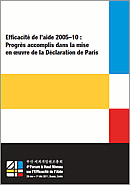Aid effectiveness targets have been missed
Published on Sat, 2011-09-24 19:48
Source: Better Aid The report “Aid Effectiveness 2005-2010: Progress in Implementing the Paris Declaration”, released on Thursday by the OECD, shows that the richest countries, which currently provide the lion’s share of development aid ($120 billion of aid annually), have made disappointing progress in making this significant sum work to address poverty. “The survey shows that every effort must be made to ensure that the upcoming high level event on aid effectiveness in South Korea this November focuses on committing these countries to meaningful reforms,” says Gideon Rabinowitz from the UK Aid Network and BetterAid, a civil society coalition of which Social Watch is a member. The official evaluation of the implementation of the Paris Declaration and its sister agreement, the Accra Agenda for Action, found that they have helped to build trust and deepen development partnerships between donors and developing countries, and begun to promote better development results. However, the survey also shows that since 2005 there has been no progress on untying aid. Furthermore, there has been barely any progress in getting information on aid flows, or in donors delivering promised aid, and donors have only met 1 of the 9 global targets that they are primarily responsible for meeting. The picture across donors does vary; Denmark met 7 of its reform targets, Ireland 6 and Australia and Sweden 5. Although the UK only met 3 of its targets, it has made progress across a range of areas and is one of the top performing donors overall. This contrasts with donors such as France, who has met only 2 targets and is in the bottom third of donors, and the US, which has met 1 target and is only avoids being labelled as the worst performing donor by Turkey – a new donor of whom little is yet expected. An upcoming Report from BetterAid partner the CSO Reality of Aid Network, gives a civil society perspective on progress since the Paris Declaration. The report confirms several results of the OECD study and supplements its findings by critically adding the slow progress made in broadening development for civil society participation and achieving development results for the people. In fact, this Report and others point to increased restrictions on civil society actions in development, despite the commitments made in the 2008 Accra Agenda for Action. Generally, the report finds that donors made less effort than developing countries in implementing aid effectiveness commitments, even though the commitments demanded less from donors.
» |
SUSCRIBE TO OUR NEWSLETTER



